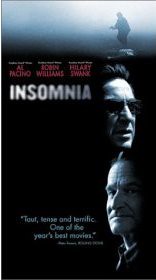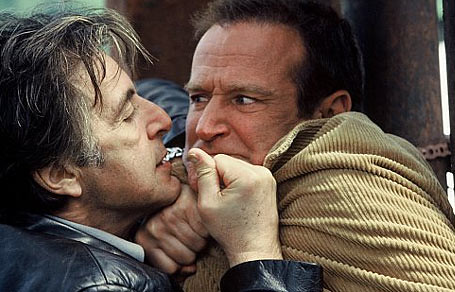A Sleeper Hit
A review of “INSOMNIA” by James Harleman
 – Starring Al Pacino and Robin Williams
– Starring Al Pacino and Robin Williams
– Directed by Christopher Nolan
– 1 hour 58 minutes, rated R
The previews make it appear fairly simple; Al Pacino plays grizzled veteran L.A. cop, Frank Dormer, sent with his partner up to the frigid north of Alaska to assist local authorities with a murder quite uncommon to the region. Since the town is located in an uncomfortable geographic location on our planet-where the sun remains up for months-the detective finds he is unable to sleep out of his element. Add the obligatory dose of paranoia, someone who is probably the killer calling the detective at his motel room, and local authorities that aren’t particularly pleased with Dormer’s “help”, and this might seem like a typical murder-mystery thriller. except that it isn’t, and the film’s surprising complexity makes it a wonder to behold.
Owing much of it’s rich plot to the original Norwegian version of the film by screenwriters Nikolaj Frobenius and Erik Skjoldbjærg, director Christopher Nolan (Memento) chose and executed his second major film production well. What looked to be predictable and banal unfolds as a rich tapestry of hypocrisy and compromising positions. The metaphorical baggage that Dormer and his partner bring with them is complex, and the resulting situation between cop and killer turns a typically black and white scenario into shades of grey, that become increasingly harder to discern as the characters lose their grip on their environment and themselves.
It’s preferable to see this film without any more plot specifics, so I’ll try to leave the review spoiler-free; though not as cinematically unique or experimental as “Memento”, “Insomnia” involves revelations and story progression that is best served with a side of ignorance. These surprises are not pre-packaged A-bomb endings like those of “The Sixth Sense” or “Fight Club”, but rather the nuanced unraveling of our usual character assumptions. Between a dirty-white landscape, washed-out vistas, and encroaching fog, the viewer experiences the weight of the climate and sleeplessness Dormer faces.
The acting is superlative; Robin Williams, phoning in his performances for the last decade, reminds us how impressed we were with “Dead Poet’s Society” and “Awakenings”, eyes wide over the fact that he could do more than comedy, more than chewing scenery and mugging for the camera. I think I have always preferred his dramatic work, and now-after some time out in wasted space-“Mork” has finally come back to earth; Williams has found his serious voice once again. Pacino delivers consistent quality, and yet Nolan’s direction seems to flesh out his conflicted character’s mind with even more alacrity than usual. Hilary Swank, with another role that could easily have been a stereotype, breathes life and depth into the small-town cop, who holds both professional fascination and trepidation regarding the veteran Dormer.
 What is truly fascinating, however, is the territory the film explores in relation to mankind’s desperate struggle to determine right and wrong. In “Memento”, Nolan dealt with mankind’s perceptual limitations in dealing with reality. With “Insomnia, he gets even more personal, unveiling the ease with which we may all be corrupted. People-even Christians-often point at obvious sins, public sinners, and “criminals”. forgetting that, as scripture tells us, that to merely transgress one law is to be guilty of breaking them all. The whitest lie makes us as guilty as the most heinous killer. A character in the film tells Dormer that we just “do what we feel is right at the time, and then try to live with it.” By the end of the film, this method of circumstantial “morality-without-foundation” is shown to be errant, inconsistent. and ultimately destructive. Our consciences do give us a general knowledge of right and wrong, yet we are tainted beings, unable to live according to our conscience or our man-made rules. Something is missing, and Pascal’s “God-shaped hole” is as present in this film as a sucking chest wound.
What is truly fascinating, however, is the territory the film explores in relation to mankind’s desperate struggle to determine right and wrong. In “Memento”, Nolan dealt with mankind’s perceptual limitations in dealing with reality. With “Insomnia, he gets even more personal, unveiling the ease with which we may all be corrupted. People-even Christians-often point at obvious sins, public sinners, and “criminals”. forgetting that, as scripture tells us, that to merely transgress one law is to be guilty of breaking them all. The whitest lie makes us as guilty as the most heinous killer. A character in the film tells Dormer that we just “do what we feel is right at the time, and then try to live with it.” By the end of the film, this method of circumstantial “morality-without-foundation” is shown to be errant, inconsistent. and ultimately destructive. Our consciences do give us a general knowledge of right and wrong, yet we are tainted beings, unable to live according to our conscience or our man-made rules. Something is missing, and Pascal’s “God-shaped hole” is as present in this film as a sucking chest wound.
While, like many contemporary movies, “Insomnia” rails against the notion that situations are black and white-that we are all caught, by our own hypocrisy, in variant shades of grey, this film notes that this human condition is a dismal, bleak, and wholly unsatisfying way to live one’s life. It offers no efficacious solution, and leaves the viewer wondering just how to get through life without becoming compromised, and growing old with guilt and regret.


